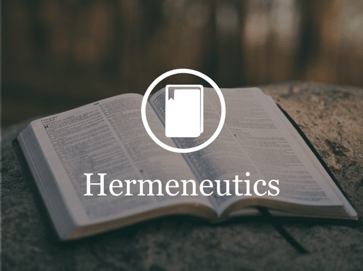When reading the psalms, it is easy to read quickly over a word like “rock” and think little of it. We might think that this is just the common language of the day. But the psalmists were theologians, especially David. And packed into this little word is a mountain of theology that travels all the way back to Moses.
Moses was the first to speak about God like this. He was searching for a way to say that God is solid, that He wouldn’t collapse under pressure, that He would always remain the same, that He is stable and reliable—and so Moses called God his rock. He writes in Deuteronomy, “Ascribe greatness to our God! The Rock!” (32:3-4)
The word rock is the word used for the face of a mountain. Mountains don’t move. They are strength itself. There is no fear of collapse. They will always hold you up. And Moses said, That’s my God. He will hold us up. He will never break under the pressure. He won’t move.
David read Moses and said, That’s the perfect word for my relationship with God.
We often assume that every psalm-writer refers to God as my rock, but if you actually study the psalter, this is David’s personal name for God. No other person in the Psalter uses “Rock” as a title for God. Why?
Because David learned what it meant for God to be his rock
Here is what it meant to David for God to be his rock:
God’s faithfulness is powerful.
David writes in Psalm 18:2, “The Lord is my rock and my fortress and my deliverer, My God, my rock, in whom I take refuge; My shield and the horn of my salvation, my stronghold.” Then David proceeds to illustrate this truth. He says that the whole earth shakes when God wants to intervene for His people. What David details in this psalm is the might of God in creation and in the exodus. David says to the Lord, I know you are that faithful. You are powerfully faithful.
Sometimes we talk about God’s faithfulness in imprecise terms. What we too often mean when we speak of God’s faithfulness is that He’s nice. The problem is that niceness doesn’t help anybody. The faithfulness of God has power. It is backed with omnipotence. It is backed with the reality that if a situation demands it, God will move heaven and earth. He will in no way restrict Himself. If His promises are in jeopardy, God will act. God’s faithfulness has substance to it.
God’s faithfulness is exclusive.
David writes, “For who is God, but the Lord? And who is a rock, except our God” (Psalm 18:31). The faithfulness of God is exclusive. After David was delivered from his enemies, he realized that the only way he could explain his deliverance was that the one and only God had been faithful to him. God’s faithfulness is like no other.
In the same way, the faithfulness of God is the only thing that can explain your redeemed life. You must be convinced of this. We can too often use faithful to describe anything and everything—people are faithful at work, people are faithful at home, even pets are faithful. Everything is faithful.
But we must be convinced that the faithfulness of God is entirely other. There can be no comparison. It is altogether separate. It is the only explanation for why we are where we are now.
So what is our response? We respond with David: “The Lord lives, and blessed be my rock; And exalted be the God of my salvation” (Psalm 18:46). We worship Him for who He is.
The faithfulness of God is central in life.
David writes in Psalm 61, “From the ends of the earth, I call to you and my heart is faint. Lead me to the rock that is higher than I.”
Who is this rock? David writes in the next verse, “You are my refuge and strength.”
The rock is God Himself. David learned that when you’re in trouble, no matter where you are—even if you are at the ends of the earth—no matter what is going on—even if your heart is faint—you always run to one person, God. Because He is faithful. This is the only way you will have resolution. David is pleading with us to take it from him, because he learned this lesson. You don’t run to money, to friends, to a book, to positive thinking—you run to God’s faithfulness. That should be the first thing that enters your mind when you are in trouble.
Study Hermeneutics with Dr. Abner Chou
Learn to discover meaning in the vast genres of Scripture in a self-paced, interactive format designed for church leaders and lay-men and women alike.
God is faithful even when you are alone.
David learned this lesson well. He wrote, “For in the day of trouble He will conceal me in His tabernacle; In the secret place of His tent He will hide me; He will lift me up on a rock” (Psalm 27:5). Just several verses later David writes, “For my father and my mother have forsaken me, But the Lord will take me up” (27:10).
David reminds us that he understands what it means to be alone. However, even at the height of such abandonment—when his own family left him, David saw that God never did. God never fails. He is still faithful no matter the circumstances. That’s what makes Him our unchanging rock. Even when you feel most isolated, God is still there with us.
The mountain won’t crumble, even when everything else seems like it has.
God is faithful when we are not at peace.
Within this, David begins by saying he will not be greatly shaken (v. 1) and then later says he will not be shaken (v. 6). Why the change? In sum, as David continues to meditate upon God he realizes that he not only will not be greatly shaken, he will not be shaken at all. That is because of who God is.
Because God is so unmovably loyal, we can be at rest
Far too often our hearts are restless, and we cannot silence our worries and fears. They just echo and ricochet around our minds.
David could resonate. And David says, You know what I’ve learned? The only thing that will calm your soul is the faithfulness of God. He is your rock. Think about Him.
And this is what David writes in Psalm 62: “Pour out your heart before Him; God is a refuge for us” (62:8).
God will always listen to us when we pray. That will never change. This is the only way we can ever have peace in our souls.
God is faithful in every situation.
In Psalm 31, David writes, “Be to me a rock of strength” (31:2).
David’s prayer is simple, Be to me who you are, God
In this psalm David looks back upon his life, and he reflects upon all that he has been through in his time on this earth. He talks about his enemies, and then he writes, “For my life is spent with sorrow and my years with sighing; My strength has failed because of my iniquity” (31:10).
David learned that sometimes problems are the result of others, but sometimes we have problems because of ourselves. David says, Whether it’s personal or interpersonal, internal or external, here’s how you pray: God, be who you are to me. Be my rock. Hold me fast. Be strong for me.
God is faithful even when He is silent.
David writes, “To you, Oh Lord, I call; My rock, do not be deaf to me. For if you are silent to me, I will become like those who go down to the pit” (28:1). David knows. He knows there are times in life when God seems absent, when He feels hidden. David learned to call upon God even in His silence. Why? Because God never changes. Even when He doesn’t seem to be there, He is still the rock.
God empowers.
David writes, "Blessed be the Lord, my rock, who trains my hands for war and my fingers for battle" (Psalm 144). God is David’s rock in that He empowers him. The reality that God is rock is not always defensive, but it can empower people as well. In this psalm, David is trusting God as his rock relative not only to his general faithfulness, but for his faithfulness to David in the promises of the Davidic covenant. While none of us are Davidic kings eligible for the promises of the Davidic covenant, we can still learn about the faithfulness of God. It doesn’t just protect us; it empowers us. When we have an overwhelming task ahead of us, God’s faithfulness is sufficient to get us through.
God's faithfulness is the standard for our faithfulness.
We are all familiar with Psalm 19. At the end of this psalm about general and special revelation—about the transforming power of God’s word—David concludes: “Let the words of my mouth and the meditation of my heart be acceptable in Your sight, O Lord, my rock and my Redeemer” (19:14).
Why does David interject that God is his rock and redeemer? In context, David wants to live a life that is faithful to God. That life revolves around God’s Word. In David’s final statement, he expresses his desire that his faithfulness to Scripture be as faithful as God is to him.
Sometimes when we say faithfulness, we don’t really mean faithfulness. We say we want to be faithful but all we mean is that we want to try. We have no standard for what faithfulness really entails. When David spoke of faithfulness, he meant this: The way God was faithful to me, that’s what I want to show back to Him. That’s the level of faithfulness we need toward God.
God’s faithfulness is our standard
God's faithfulness goes beyond the grave.
The last words of David are found in 2 Samuel 23. What does David say on his deathbed? He says, “The God of Israel said, the Rock of Israel spoke to me” (23:3). We have seen that David spent his entire life calling the Lord his rock. God has proven this through various events in his life. So on his deathbed, David continues to call Him his rock. Why? Because he knows the faithfulness of the Lord will continue beyond death.
That is why David continues, “Truly is not my house so with God?” (23:5) David’s life ends without the fulfillment of the Davidic covenant. He faced two coups and had yet to see the fulfillment of all the promises made to him, and he still writes, “For He has made an everlasting covenant with me, ordered in all things, and secured” (23:5). David says, I know God hasn’t fulfilled His promises yet, but I know He will. He has kept His promises and will keep His promises to me to the end.
Those who are on their deathbeds can know that God is faithful, not just until the final breath, but even after it. That is the faithfulness of our rock. It is eternal.





